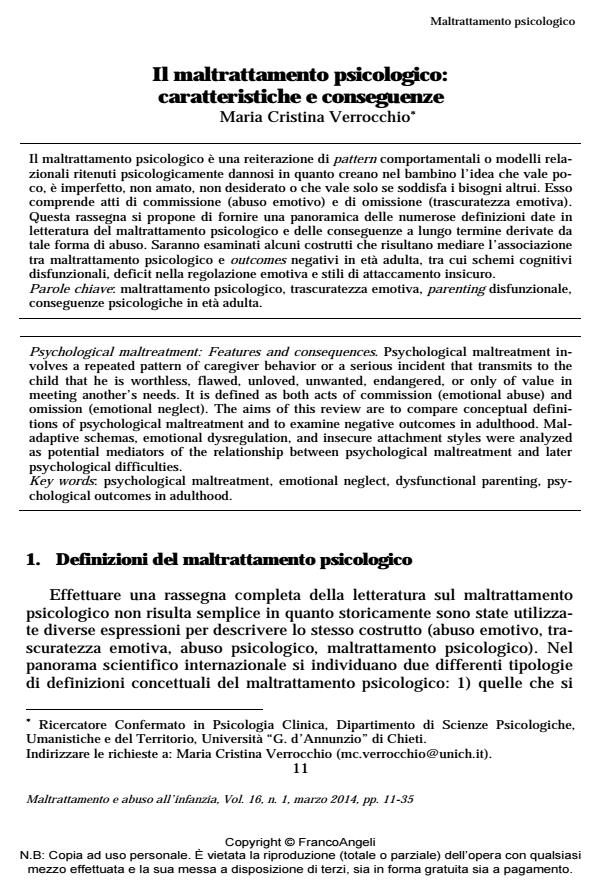Il maltrattamento psicologico: caratteristiche e conseguenze
Titolo Rivista MALTRATTAMENTO E ABUSO ALL’INFANZIA
Autori/Curatori Maria Cristina Verrocchio
Anno di pubblicazione 2014 Fascicolo 2014/1
Lingua Italiano Numero pagine 25 P. 11-35 Dimensione file 137 KB
DOI 10.3280/MAL2014-001002
Il DOI è il codice a barre della proprietà intellettuale: per saperne di più
clicca qui
Qui sotto puoi vedere in anteprima la prima pagina di questo articolo.
Se questo articolo ti interessa, lo puoi acquistare (e scaricare in formato pdf) seguendo le facili indicazioni per acquistare il download credit. Acquista Download Credits per scaricare questo Articolo in formato PDF

FrancoAngeli è membro della Publishers International Linking Association, Inc (PILA)associazione indipendente e non profit per facilitare (attraverso i servizi tecnologici implementati da CrossRef.org) l’accesso degli studiosi ai contenuti digitali nelle pubblicazioni professionali e scientifiche
Il maltrattamento psicologico è una reiterazione di pattern comportamentali o modelli relazionali ritenuti psicologicamente dannosi in quanto creano nel bambino l’idea che vale poco, è imperfetto, non amato, non desiderato o che vale solo se soddisfa i bisogni altrui. Esso comprende atti di commissione (abuso emotivo) e di omissione (trascuratezza emotiva). Questa rassegna si propone di fornire una panoramica delle numerose definizioni date in letteratura del maltrattamento psicologico e delle conseguenze a lungo termine derivate da tale forma di abuso. Saranno esaminati alcuni costrutti che risultano mediare l’associazione tra maltrattamento psicologico e outcomes negativi in età adulta, tra cui schemi cognitivi disfunzionali, deficit nella regolazione emotiva e stili di attaccamento insicuro.
Parole chiave:Maltrattamento psicologico, trascuratezza emotiva, parenting disfunzionale, conseguenze psicologiche in età adulta
- Gli abusi sui minorenni nello sport: prevalenza, tipologie e direttive Europee Lilybeth Fontanesi, Olimpia Planzo, Giulia Cosi, in MALTRATTAMENTO E ABUSO ALL'INFANZIA 3/2024 pp.31
DOI: 10.3280/MAL2023-003003 - Ostilità verbale materna durante il lockdown dovuto al COVID-19: il ruolo dell'abuso verbale infantile, della stabilità emotiva e del burnout genitoriale Daniela Marchetti, Lilybeth Fontanesi, Serena Di Giandomenico, Cristina Mazza, Paolo Roma, Maria Cristina Verrocchio, in MALTRATTAMENTO E ABUSO ALL'INFANZIA 3/2021 pp.37
DOI: 10.3280/MAL2021-003003 - Esperienze traumatiche e disturbo alimentare: dalla nascita all'età adulta Nicoletta Ragonese, in MALTRATTAMENTO E ABUSO ALL'INFANZIA 1/2015 pp.7
DOI: 10.3280/MAL2015-001001 - Parental psychological control: An intrusive form of parenting Rosalba Larcan, in MALTRATTAMENTO E ABUSO ALL'INFANZIA 2/2020 pp.7
DOI: 10.3280/MAL2020-002001 - La disorganizzazione dell'attaccamento spiega i sintomi post-traumatici nei bambini vittime di violenza intrafamiliare? Elena Camisasca, Sarah Miragoli, Paola Di Blasio, in MALTRATTAMENTO E ABUSO ALL'INFANZIA 2/2014 pp.35
DOI: 10.3280/MAL2014-002003 - Le memorie traumatiche e il corpo: uno studio su maltrattamento infantile, consapevolezza interocettiva e sintomi somatici Luana La Marca, Andrea Scalabrini, Clara Mucci, Adriano Schimmenti, in MALTRATTAMENTO E ABUSO ALL'INFANZIA 3/2018 pp.47
DOI: 10.3280/MAL2018-003004 - Parenting invalidante e dipendenze tecnologiche: il ruolo del controllo psicologico genitoriale Maria Cristina Gugliandolo, Valeria Verrastro, Francesca Liga, in MALTRATTAMENTO E ABUSO ALL'INFANZIA 3/2019 pp.55
DOI: 10.3280/MAL2019-003005 - Il ruolo del trauma infantile nell'insorgenza del Binge Eating Disorder Vincenzo Caretti, Cettina Crisafi, Nicoletta Ragonese, in MALTRATTAMENTO E ABUSO ALL'INFANZIA 1/2015 pp.13
DOI: 10.3280/MAL2015-001002 - I precursori della violenza infantile nel periodo perinatale: una review della letteratura Stefania Cataudella, Giulio Cesare Zavattini, in MALTRATTAMENTO E ABUSO ALL'INFANZIA 2/2015 pp.11
DOI: 10.3280/MAL2015-002002 - Fattori psicologici che procrastinano la richiesta d'aiuto nella violenza domestica: il ruolo delle dinamiche familiari Ugo Pace, Marco Cacioppo, Carla Zappulla, Giulio D’Urso, Vincenzo Caretti, in MALTRATTAMENTO E ABUSO ALL'INFANZIA 3/2018 pp.73
DOI: 10.3280/MAL2018-003005 - Preliminary development and psychometrics characteristics of a multidimensional measure of Parental Psychological Control: The Inventory of Parental Psychological Control (IPPC) Francesca Cuzzocrea, Sebastiano Costa, Marco Cannavò, Maria Cristina Gugliandolo, in MALTRATTAMENTO E ABUSO ALL'INFANZIA 2/2020 pp.55
DOI: 10.3280/MAL2020-002004 - Esperienze Sfavorevoli Infantili e Spazio Neutro protetto. Valutazione d'efficacia di un modello di buone prassi nella conduzione degli incontri protetti genitori-figli Maria Serena Saddemi, Maria Assunta Strano, in MALTRATTAMENTO E ABUSO ALL'INFANZIA 1/2019 pp.91
DOI: 10.3280/MAL2019-001007
Maria Cristina Verrocchio, Il maltrattamento psicologico: caratteristiche e conseguenze in "MALTRATTAMENTO E ABUSO ALL’INFANZIA" 1/2014, pp 11-35, DOI: 10.3280/MAL2014-001002